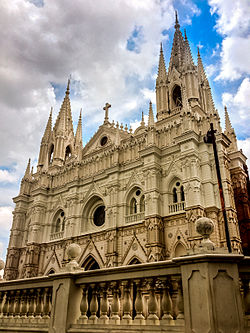Religion in El Salvador (2022 estimate)[1]

Christianity is the predominant religion in El Salvador,[2] with Catholicism and Protestantism being its main denominations. The Catholic share of the population is on decline while Protestants are experiencing rapid growth in recent decades.[3]
In 1528 Spanish, after the foundation of San Salvador village by the Conquistador Diego de Alvarado, part of the territory of modern day El Salvador was named after Jesus Christ - San Salvador (lit. "Holy Savior"), that from 1579 also including the province of San Miguel; and the other part, from 1556, was named Holy Trinity of Sonsonate; both jurisdictions joined in 1824 in El Salvador, or Salvador, during the post-Federal Republic period and subsequently settled on as El Salvador.[4]
El Salvador is a secular country and the freedom of religion is enshrined in the nation's constitution. However, the constitution grants automatic official recognition to the Catholic Church and requires other religious groups to apply for official recognition through registration.[5]
- ^ José Simeón Cañas Central American University (UCA El-Salvador), 2022 report
- ^ "El Salvador 2022 report, US State Dept".
- ^ Stephen Offutt, New Centers of Global Evangelicalism in Latin America and Africa (Cambridge University Press, 2015) focuses on El Salvador the north central south America and South Africa.
- ^ El nombre oficial de la República de El Salvador (PDF). Gobierno de la República de El Salvador. 2015. ISBN 978-99923-0-274-3. Archived from the original (PDF) on 11 November 2020. Retrieved 6 September 2020.
- ^ "El Salvador 2022 report, US State Dept".